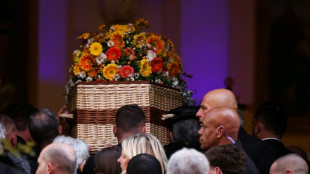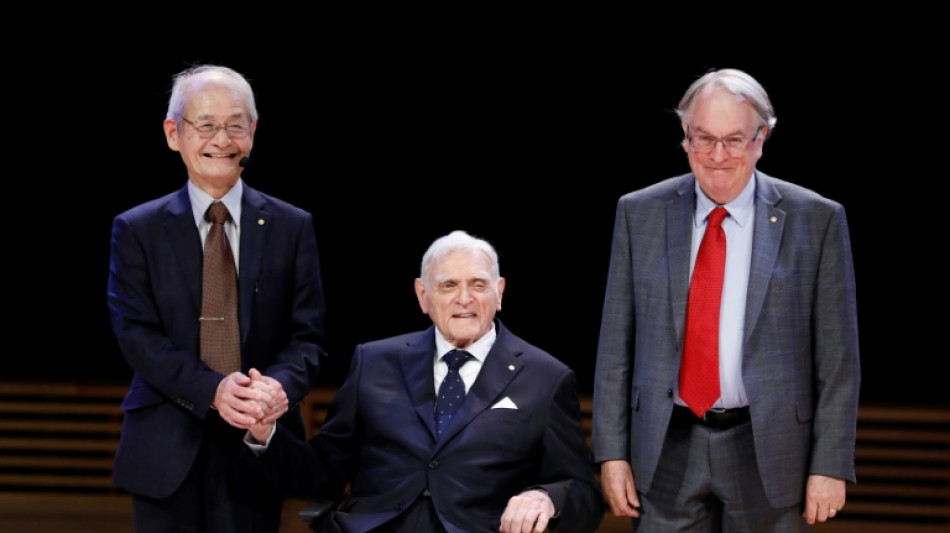
-
 Russia slams Western peacekeeping plan for Ukraine
Russia slams Western peacekeeping plan for Ukraine
-
Bordeaux's Du Preez wary of Northampton's Champions Cup revenge mission

-
 Romero apologises for Spurs slump as crisis deepens
Romero apologises for Spurs slump as crisis deepens
-
Former Premier League referee Coote gets suspended sentence for indecent image

-
 New clashes hit Iran as opposition urges protests, strikes
New clashes hit Iran as opposition urges protests, strikes
-
Stocks retreat as traders eye geopolitics, US jobs data

-
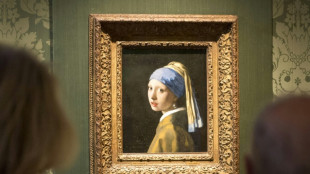 'Girl with a Pearl Earring' to be shown in Japan, in rare trip abroad
'Girl with a Pearl Earring' to be shown in Japan, in rare trip abroad
-
Syria tells civilians to leave Aleppo's Kurdish areas

-
 'Sign of life': defence boom lifts German factory orders
'Sign of life': defence boom lifts German factory orders
-
Japan's Fast Retailing raises profit forecast after China growth

-
 Olympic champion Zheng out of Australian Open
Olympic champion Zheng out of Australian Open
-
England's Brook 'deeply sorry' for nightclub fracas

-
 New clashes in Iran as opposition urges more protests
New clashes in Iran as opposition urges more protests
-
Equity markets mostly down as traders eye US jobs data

-
 England cricket board launches immediate review into Ashes debacle
England cricket board launches immediate review into Ashes debacle
-
Dancing isn't enough: industry pushes for practical robots
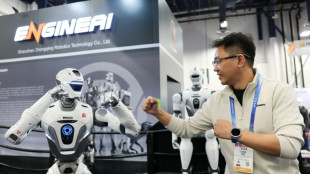
-
 Asian markets mostly down as traders eye US jobs data
Asian markets mostly down as traders eye US jobs data
-
Australia to hold royal commission inquiry into Bondi Beach shooting

-
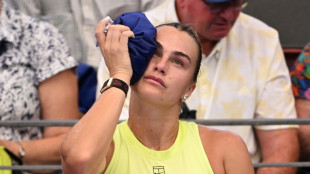 Sabalenka accuses tour chiefs over 'insane' tennis schedule
Sabalenka accuses tour chiefs over 'insane' tennis schedule
-
Cambodia to liquidate bank founded by accused scam boss

-
 Farmers enter Paris on tractors in protest at trade deal
Farmers enter Paris on tractors in protest at trade deal
-
Viral 'Chinese Trump' wins laughs on both sides of Pacific

-
 Stokes vows to stay on but 'wrongs to put right' after crushing Ashes defeat
Stokes vows to stay on but 'wrongs to put right' after crushing Ashes defeat
-
Lidl to drop broadcast TV ads in France

-
 Stokes admits 'wrongs to put right' after crushing Ashes defeat
Stokes admits 'wrongs to put right' after crushing Ashes defeat
-
Sabalenka impresses again in Australian Open warm-up, vows more to come
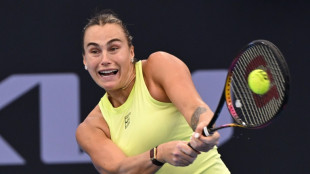
-
 Gilgeous-Alexander to the rescue as Thunder sink Jazz in overtime
Gilgeous-Alexander to the rescue as Thunder sink Jazz in overtime
-
From Diaz to 'Mazadona' - five new faces starring at AFCON

-
 Startups go public in litmus test for Chinese AI
Startups go public in litmus test for Chinese AI
-
Death of Bazball: Five things we learned from Ashes series

-
 Australia's emotional Khawaja bows out for final time with Ashes win
Australia's emotional Khawaja bows out for final time with Ashes win
-
Asian markets mixed as traders eye US jobs data

-
 Australia win final Test to complete 4-1 Ashes triumph over England
Australia win final Test to complete 4-1 Ashes triumph over England
-
Trump withdraws US from key climate treaty, deepening global pullback
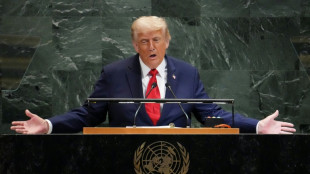
-
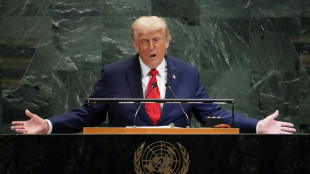 Trump pulls US out of key climate treaty, deepening global pullback
Trump pulls US out of key climate treaty, deepening global pullback
-
Morocco under huge pressure as hosts face Cup of Nations heat

-
 Australia heatwave stokes risk of catastrophic bushfires
Australia heatwave stokes risk of catastrophic bushfires
-
Australia 71-2 at lunch, need 89 more to win final Ashes Test

-
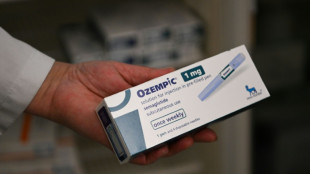 Study shows how fast kilos return after ending weight-loss drugs
Study shows how fast kilos return after ending weight-loss drugs
-
Trump pulls US out of key climate treaty, science body: White House
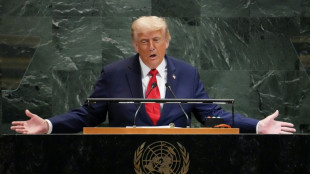
-
 England all out for 342, set Australia 160 to win final Ashes Test
England all out for 342, set Australia 160 to win final Ashes Test
-
Silver X Delivers Production Growth During the Fourth Quarter of 2025

-
 Lightwave Logic, Inc. to Attend 28th Annual Needham Growth Conference
Lightwave Logic, Inc. to Attend 28th Annual Needham Growth Conference
-
Inventus Secures $2.1 Million Gold Pre-Payment and Provides Exploration Update

-
 Datavault AI Expands IBM Collaboration to Deploy Enterprise-Grade AI at the Edge with Available Infrastructure's SanQtum AI Platform
Datavault AI Expands IBM Collaboration to Deploy Enterprise-Grade AI at the Edge with Available Infrastructure's SanQtum AI Platform
-
Bridgehead Earns ISO/IEC 27001:2022 Certification, Strengthening Global Information Security Standards

-
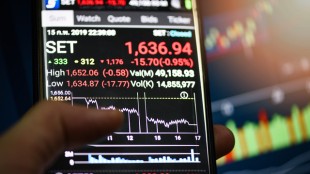 Clough Global Opportunities Fund Declares Monthly Distributions For Q1 2026, Increasing Its Distribution By 7.2% To $0.0537 Per Share; Announces Market Update Conference Call
Clough Global Opportunities Fund Declares Monthly Distributions For Q1 2026, Increasing Its Distribution By 7.2% To $0.0537 Per Share; Announces Market Update Conference Call
-
Clough Global Dividend and Income Fund Declares Monthly Distributions for Q1 2026, Increasing Its Distribution by 7.6% to $0.0566 Per Share; Announces Market Update Conference Call

-
 Ascend Advanced Therapies - ABL Inc. Further Strengthens Executive Team as It Drives Forward an Ambitious Growth Strategy
Ascend Advanced Therapies - ABL Inc. Further Strengthens Executive Team as It Drives Forward an Ambitious Growth Strategy
-
Clough Global Equity Fund Declares Monthly Distributions for Q1 2026, Increasing its Distribution by 12.2% to $0.0729 Per Share; Announces Market Update Conference Call


Nobel-winning lithium battery inventor John Goodenough dies at 100
John Goodenough, who shared the 2019 Nobel Prize in Chemistry for developing the lithium-ion battery that revolutionized modern life, has died at the age of 100, the University of Texas announced.
Goodenough died on Sunday, said the university, where he worked as an engineering professor.
The US scientist's contributions to the development of lithium-ion batteries paved the way for smartphones and a fossil fuel-free society.
"John's legacy as a brilliant scientist is immeasurable -- his discoveries improved the lives of billions of people around the world," Jay Hartzell, president of the University of Texas at Austin, said in the statement.
"He was a leader at the cutting edge of scientific research throughout the many decades of his career."
In 1986, at the age of 64, Goodenough joined the University of Texas where he served as a faculty member in the Cockrell School of Engineering for 37 years.
"The world has lost an incredible mind and generous spirit. He will be truly missed among the scientific and engineering community, but he leaves a lasting legacy that will inspire generations of future innovators and researchers," said Sharon Wood, provost of the University of Texas.
Goodenough became the oldest person to win a Nobel Prize when at the age of 97 he shared the 2019 chemistry award with Britain's Stanley Whittingham and Akira Yoshino of Japan for the invention of the lithium-ion battery.
Seeking an alternative source of power during the oil crisis of the 1970s, Whittingham discovered a way to harness the potential energy in lithium, a metal so light it floats on water.
However, the battery he constructed was too unstable to be used.
Goodenough built on Whittingham's prototype, substituting a different metal compound and doubling the potential energy of the battery to four volts.
This paved the way for far more powerful and durable batteries in the future.
In 1985, Yoshino instead used a carbon-based material that stores lithium ions, finally rendering the battery commercially viable.
The culmination of the trio's research resulted in the most powerful, lightweight and rechargeable battery ever seen.
- 'A rechargeable world' -
"They created a rechargeable world," the Royal Swedish Academy of Sciences, which awarded the accolade, said at the time.
"Lithium batteries have revolutionized our lives since they first entered the market in 1991," and were "of the greatest benefit to humankind".
Their work considerably boosted human mobility, and allowed millions in developing countries to access information and services online with just a mobile phone.
Lithium-ion batteries have also reduced the reliance on planet-warming fossil fuels, especially in electric cars.
On receiving news of his Nobel, Goodenough expressed pride in the worldwide impact of his work.
"I'm extremely happy that my discovery has been able to help communication through the world," he said.
"We need to build relationships, not wars. I am happy if people use this for good, not evil."
Born in 1922 in Germany, Goodenough grew up in the United States and earned a bachelor's degree in mathematics from Yale University.
After serving as a meteorologist in the US Army during World War II, Goodenough earned a master's degree and a PhD in physics at the University of Chicago in 1952, according to the University of Texas statement.
From 1952, he worked at the Massachusetts Institute of Technology's Lincoln Laboratory for 24 years and laid the groundwork for the development of computer random-access memory (RAM).
Goodenough was head of the inorganic chemistry laboratory at Oxford University when he made his lithium-ion battery discovery.
In 1986, he joined the University of Texas where he was known for his "quick wit and infectious laugh."
He was still coming into work well into his 90s, the university said.
Goodenough and his wife Irene were married for 70 years, until her death in 2016.
P.Stevenson--AMWN
